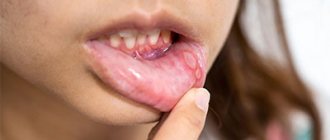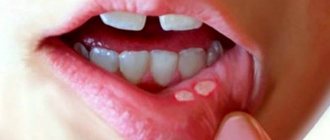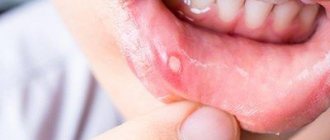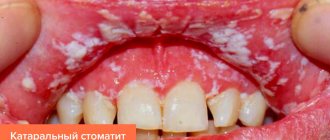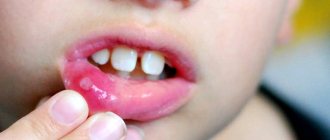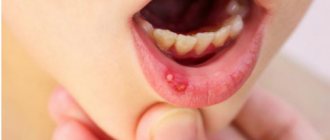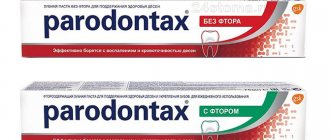Stomatitis is one of the most common dental diseases, which is expressed in damage to the oral mucosa. It occurs in both adults and children and requires urgent treatment. Treatment of stomatitis in children is usually required for children with weakened immune systems. There are many ways for infection to enter a small organism.
Urgently contact the dental department of the CELT clinic if your child exhibits the following symptoms:
- increased temperature;
- no appetite;
- a white coating appears on the gums;
- ulcers appeared in the mouth;
- lymph nodes hurt.
We have everything to carry out effective, prompt and painless treatment of stomatitis in children of any age. Bring to us children under one year old, 2-3 years old and older - and we will select effective treatment for him in each individual case.
Consultation with a pediatric dentist (pedodontist) - RUB 1,000.
Apexification with the application of a temporary filling (1 channel) - 1,500 rubles.
Filling the root canals of baby teeth - 4,000 rubles.
Installation of insulating gasket "VITRIBOND" - 800 rubles.
At CELT you can get advice from a dental specialist.
- Cost of consultation with a pediatric dentist (pedodontist) – 1,000
Make an appointment
Causes and types of stomatitis
Treatment of stomatitis in young children is carried out by treating the affected areas with special medicinal compounds, the choice of which is carried out in accordance with the etiology of the disease. Treatment is prescribed by the pediatric dentist after examining the small patient and identifying the cause and nature of the disease.
The disease can develop due to bacteria entering the mouth through dirty hands or cutlery, as well as due to a weakened immune system. The spread of pathogenic bacteria in a child’s body occurs at extreme speed due to the vulnerable mucous membrane. An additional factor is weak salivation, which causes a lack of hydration. Excessive dryness leads to cracks into which bacteria penetrate and cause disease.
Stomatitis often develops while taking pharmacological drugs. To avoid progression of the disease, you need to stop taking antibiotics. During the consultation, the decisive factor is the observations of the parents. They are the ones who can explain the cause of the disease (injury to the mucous membrane, allergies, taking antibiotics).
Symptoms
The disease is characterized by general and local symptoms. The first symptoms of a mild form of allergic stomatitis are:
- slight discomfort in the oral cavity during hygiene procedures and eating;
- inflammation and swelling of tissues;
- redness and itching of the affected areas of the mucous membrane;
- excessive salivation.
If allergic stomatitis began while taking certain medications, the patient complains of painful blisters filled with liquid. Tick-borne borreliosis is accompanied by redness, blisters on the mucous membranes, as well as bleeding erosions and wounds.
Allergic stomatitis without proper treatment develops very quickly: the patient’s body temperature rises, and bubbles and blisters appear on the skin, mucous membranes of the eyes, and genitals.
If the disease was caused by Lyme disease, red spots with a border appear in different parts of the body and are very painful. Sometimes patients complain of joint pain.
Aphthous stomatitis
Aphthous stomatitis is characterized by the appearance of a large number of aphthous stomatitis on the oral mucosa. These are round or oval ulcers covered with plaque. The causes of this disease are as follows:
- past infectious diseases: influenza, measles;
- lack of vitamin B12 and microelements in the body;
- oral injuries;
- gastrointestinal diseases.
For the most effective treatment of aphthous stomatitis in children, our specialists pay special attention to identifying the cause that caused it. Treatment of acute stomatitis in children is simply necessary, since the disease itself is very difficult. Its characteristic feature is unpleasant pain symptoms, which intensify when the ulcers are touched with hot or sweet food.
Treatment of purulent stomatitis in children requires an integrated approach. It consists not only in local treatment of ulcers with medications, but also in proper diet, frequent drinking and regular oral hygiene.
Should I turn to homeopathy?
Today, more and more patients are turning to homeopathy for stomatitis treatment. This is due to the fact that homeopathy remedies do not have serious side effects like individual medications. They contain small doses of active ingredients, which prevents them from accumulating in the human body. Very often, modern parents resort to homeopathy to treat their children, since the risk of various side effects is minimal.
Viral stomatitis
The name of viral stomatitis speaks for itself: it is caused by influenza, herpes, measles and chickenpox viruses.
Symptoms of the disease at an early stage include weakness, lethargy, a slight increase in body temperature, and pain in the mouth. When examining the oral cavity, you can see the appearance of small red ulcers on the mucous membrane and tongue. Treatment of viral stomatitis in children depends on the age of the child, the state of his immunity and the stage of the disease. As a rule, our experts recommend treating the oral mucosa with anti-inflammatory drugs and decoctions, and lubricating the affected areas with vitamin A.
Advantages and disadvantages
Like any other method, therapy using homeopathy has its pros and cons.
Since stomatitis is a rather complex disease, in advanced cases it should be treated not only with homeopathic medicines. Severe discomfort and pain can only be eliminated with the help of special medicine.
Homeopathy strengthens the body's defenses and prevents recurrence of the disease.
The best types of stomatitis that can be treated with homeopathy are aphthous and candidal stomatitis. Homeopathic remedies work to eliminate the external signs of the disease, as well as its general manifestations.
What homeopathic remedies are used to treat stomatitis?
There are several basic homeopathic remedies that are effective for stomatitis.
- Borax, where the basic substance is sodium borate. The action of the medicine is aimed at accelerating the healing process of wounds and erosions. The drug helps with voluntary drooling and distorted taste perception. It heals wounds on the cheeks and larynx very well.
- Kalium bichromicum. It is prescribed for severe inflammation of the mucous membrane and deep aphthae.
- Kalium muriaticum heals ulcers very well and also has a positive effect on the mucous membrane.
- Arsenicum is prescribed to patients with small aphthae that cause severe pain and discomfort.
Candidal stomatitis
Candidal stomatitis is known as thrush. It can appear in children even in infancy, and it is caused by saprophytic fungi, which become pathogenic when immunity decreases. With this type of stomatitis, white spots appear in the child’s mouth. In addition, there may be an occasional increase in temperature and the appearance of photophobia. Infection of a child can occur through contaminated dishes, toys or pacifiers.
Treatment of candidal stomatitis involves undergoing daily procedures in the dental office, rinsing the mouth with alkaline solutions, and taking vitamins.
Treatment of stomatitis in a child cannot be delayed, otherwise this may lead to relapse of the disease. CELT pediatric dentists recommend regular preventive examinations that will help prevent the development of serious dental diseases, including stomatitis!
Treatment of stomatitis in a child
The main rule is to immediately contact a specialist and not use any gels or ointments based on recommendations from the Internet. Each type of pathology is treated differently, so the dentist conducts a comprehensive examination. Additional consultation with an otolaryngologist or dermatologist is often required.
In complex therapy, proper oral care is prescribed and professional toothpaste is selected. Solutions and gels are required. If the form is viral, then antibiotics are used, and if it is allergic, then antihistamines are used. If necessary, medications are used to reduce the temperature (if there is fever and chills).
Disease prevention
To prevent the disease from developing or becoming chronic, it is necessary to keep your mouth clean, eat well, and give up smoking and other bad habits. It is important to promptly treat other oral diseases, such as periodontitis, gingivitis, glossitis, caries. If you suffer from chronic stomatitis, regular visits to the dentist are recommended. It is necessary to pay attention to the general condition of the body, monitor the state of the gastrointestinal tract and cardiovascular system, take vitamin complexes, get adequate sleep and lead an active lifestyle. As a preventative measure, you can rinse your mouth with a decoction of chamomile or sage, as well as warm saline solution.
Prevention of stomatitis in children
- Be sure to clean all cutlery, bottle and pacifier. Boil periodically.
- You need to brush your baby teeth 2 times a day. Cleaning should be carried out by parents up to 6 years of age, and then show all the movements to the child and teach him proper oral hygiene.
- After eating food, you need to rinse your mouth with boiled or filtered water that is well removed from bacteria.
- Wash your hands and all toys regularly. Children often put their fingers or toys in their mouths - wean them off this (many pathogenic bacteria get into the mucous membranes).
- Visit your dentist 2 times a year for a visual examination and disease prevention.
- Do not give your child too hot or cold food. Avoid hard, spicy, sour and very salty foods. This will lead to injury to the oral mucosa.
- Avoid foods that cause allergies.
- Provide a healthy diet rich in minerals and vitamins. It is advisable to walk outdoors more often. All this helps strengthen the immune system and protect against stomatitis.
Causes of the disease
As is clear from the name of the disease, a negative reaction of the body develops after contact with various allergens. Most often, allergic stomatitis occurs after contact with plant pollen or mold spores. The disease can also manifest itself against the background of:
- installation of crowns, fillings, prostheses made of low-quality materials;
- consumption of certain types of food (especially in children);
- decreased immunity;
- course of treatment with antibacterial drugs or sulfonamides;
- advanced caries;
- bleeding gums;
- inflammation of the oral cavity;
- proliferation of pathogenic microorganisms in the oral cavity.
Sometimes allergic stomatitis manifests itself as a complication of Lyme disease, systemic lupus erythematosus, aphthous stomatitis, hemorrhagic diathesis, and Stevens-Johnson syndrome.
How to care for a child after stomatitis appears?
Without the help of parents, a child will never get rid of the disease, because strict discipline is needed. You must follow all the requirements of the pediatric dentist and pay special attention to diet and pain medications.
Prefer soft food with a temperature of no more than 28o C. It is important that it has a balanced composition of carbohydrates, fats, proteins, vitamins, and minerals. Allergens, as well as spicy, sweet, sour and very salty foods, must be excluded from the diet. It is advisable to exclude citrus fruits due to their high acid content. After eating, rinse your mouth with filtered or boiled water.
Treatment includes the use of painkillers. The child will feel severe pain at first, which will interfere with sleep. Therefore, you need to regularly rinse your mouth not only with clean water, but also with medicinal balms. The affected area should be smeared with medicinal gel. All recommendations for treatment and pain relief will be given to you by your pediatric dentist during your consultation.
Make an appointment through the application or by calling +7 +7 We work every day:
- Monday—Friday: 8.00—20.00
- Saturday: 8.00–18.00
- Sunday is a day off
The nearest metro and MCC stations to the clinic:
- Highway of Enthusiasts or Perovo
- Partisan
- Enthusiast Highway
Driving directions
How is stomatitis treated?
If a disease is detected, in order to avoid its development and aggravation, it is necessary to urgently visit a doctor who will prescribe the optimal course of therapy. However, there are generally accepted measures that should be followed in order to quickly get rid of an unpleasant illness:
- Isolation of the patient. It is necessary to provide him with separate dishes and personal hygiene products.
- Using pain medications to reduce pain and discomfort.
- Ventilation and humidification of the room.
- Proper nutrition. It is necessary to eliminate sour and spicy foods for a while. It is important to ensure that food is not very cold or too hot.
Stomatitis can be treated using several methods: medication, folk remedies, and homeopathic medicines.
